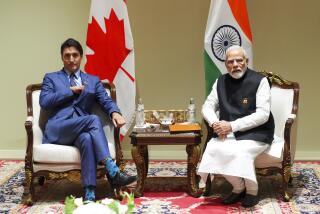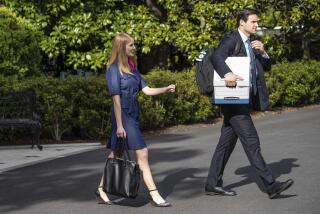Canadian Aid Sought in Deaver Inquiry
- Share via
WASHINGTON — Despite a rebuff from Ottawa, a House investigator voiced hope Saturday that Canada’s government will eventually aid a planned inquiry into the circumstances under which Michael K. Deaver became a lobbyist for Canada soon after he resigned as a White House aide.
“We consider the question of Canadian cooperation to be open,” Michael F. Barrett Jr., chief counsel of the Oversight and Investigations subcommittee of the House Energy and Commerce Committee, said when told of official Canadian opposition to aiding hearings scheduled for early May by Rep. John D. Dingell (D-Mich.). Dingell is chairman of both the subcommittee and its parent committee.
Canada States Position
Barrett appeared to be hoping for a loophole in the position laid down by Paul Frazier, spokesman for Canada’s External Affairs Department, who said in Ottawa: “It has been the longstanding practice of the Canadian government not to give evidence nor to appear before committees or panels of foreign governments.”
Frazier said he knew nothing of a letter urging cooperation with the inquiry that Barrett said Dingell had sent by messenger on Friday to Allan E. Gotlieb, the Canadian ambassador to the United States. There was no immediate response from the Canadian Embassy here to a request for comment on the letter.
Canadian failure to supply evidence on the sequence of events leading up to Deaver’s employment as a lobbyist for Canada could affect both the House investigation and a separate survey of possible conflict-of-interest violations by Deaver undertaken at Dingell’s request by the General Accounting Office, an arm of Congress.
Reports Being Tracked
Deaver signed his $105,000-a-year contract with the Ottawa government last July, two months after he resigned as deputy White House chief of staff to set up his lobbying firm, Michael K. Deaver & Associates. But investigators are tracking reports that he took part in discussions that led President Reagan and Canadian Prime Minister Brian Mulroney to agree at their March, 1985, summit meeting to name special envoys to work out steps to reduce acid rain caused by emissions from U.S. factories and power plants.
Reagan has rejected as “ridiculous” a demand by five Democratic senators for appointment of an independent counsel to review not only the Canadian case but Deaver’s contacts with the executive branch offices, including the National Security Council and the Office of Management and Budget, on behalf of other clients.
Officials Make Distinction
Federal law forbids former policy-making officials to represent anyone before their old agencies for a year after they leave government. Some Administration officials contend that Deaver did not violate the statute in meeting with officials of the OMB and the security council because they are technically part of the Executive Office, which they maintain is separate from the White House proper under the ethics statute.
Deaver was reported Saturday by the New York Times to have sketched his lobbying activities for foreign governments in a report he filed Friday with the Foreign Agents Registration section of the Justice Department. The semiannual report, required by law, summarized activities on behalf of clients that include South Korea, Saudi Arabia, Mexico and Singapore, the newspaper said.
Times staff writer Kenneth Freed contributed to this report from Ottawa.
More to Read
Sign up for Essential California
The most important California stories and recommendations in your inbox every morning.
You may occasionally receive promotional content from the Los Angeles Times.













